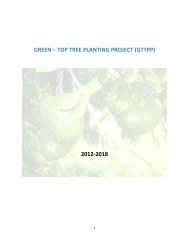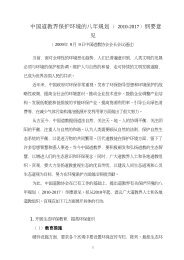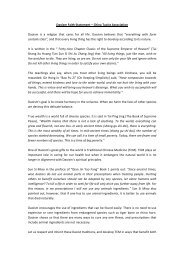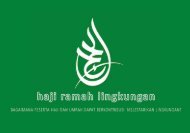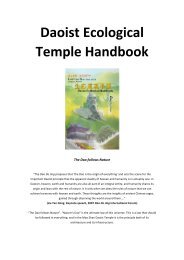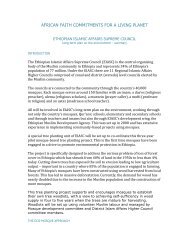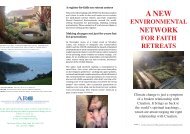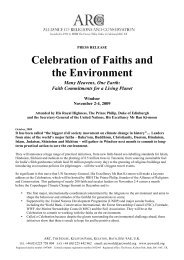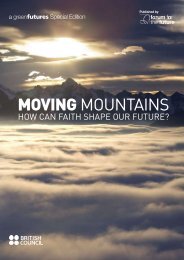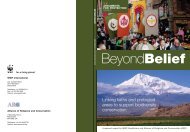summary paper - Alliance of Religions and Conservation
summary paper - Alliance of Religions and Conservation
summary paper - Alliance of Religions and Conservation
Create successful ePaper yourself
Turn your PDF publications into a flip-book with our unique Google optimized e-Paper software.
Even when children are in school, they are <strong>of</strong>ten not meeting their learning potential due to ill health <strong>and</strong><br />
inconvenience caused by helminth infections <strong>and</strong> diarrhoea. Programmes that combine improved<br />
sanitation <strong>and</strong> h<strong>and</strong>washing facilities in schools with hygiene education can improve the health <strong>of</strong><br />
children for life. Where properly integrated into wider community initiatives, schoolbased programmes<br />
also promote positive change in communities as a whole.Bhutan <strong>of</strong>fers a good example <strong>of</strong> UNICEF<br />
partnering with the government <strong>and</strong> religious leaders to address critical environmental issues.<br />
The “Religion <strong>and</strong> Health Project” conducted in cooperation with the Ministry <strong>of</strong> Health <strong>and</strong> the National<br />
Council <strong>of</strong> Religious Affairs, helps improve the health situation <strong>of</strong> the child monks through a programme <strong>of</strong><br />
upgrading water, sanitation <strong>and</strong> hygienic practices in monasteries. About 1,800 child monks <strong>and</strong> 1,200<br />
adult monks in more than 30 monasteries have benefited from this project.<br />
In fortyyears <strong>of</strong> water <strong>and</strong> sanitation work in the field in 91 countries, UNICEF has learned some valuable<br />
lessons, including the fact that sustainable service delivery depends on decentralized authority; public<br />
<strong>and</strong> private sector resources <strong>and</strong> expertise, with adequate central support; <strong>and</strong> empowered communities<br />
making wellinformed choices in technical, management <strong>and</strong> financial options.<br />
In wartorn Somalia, UNICEF is working in partnership with nearly 200 mosques to pilot an approach<br />
which has been successfully implemented in other Islamic societies whereby water, environment <strong>and</strong><br />
sanitation management committees are established through the local mosque. These genderbalanced<br />
committees are formed <strong>and</strong> trained in financial management, operational maintenance <strong>and</strong> social<br />
mobilization on hygiene <strong>and</strong> sanitation. Income generated from the water point is reinvested in the water<br />
supply system to ensure its continued operation.<br />
UNICEF has a long history <strong>of</strong> working with religious communities across the globe. Their moral authority<br />
<strong>and</strong> their vast constituencies make them uniquely powerful allies for children. Worldwide, UNICEF <strong>and</strong><br />
religious groups work together on a wide range <strong>of</strong> programmes for children in areas such as education,<br />
environment, child protection <strong>and</strong> health care. This past August, UNICEF Executive Director, Ms. Ann M.<br />
Veneman, joined religious leaders from countries around the globe gathered in Kyoto, Japan for the<br />
Eighth World Assembly <strong>of</strong> <strong>Religions</strong> for Peace. Ms. Veneman called for greater cooperation among<br />
religions to protect children from the threats <strong>of</strong> poverty, disease <strong>and</strong> violence. “Too many members <strong>of</strong> the<br />
human family do not share in the benefits <strong>of</strong> real <strong>and</strong> lasting peace”, she said, “ the conflicts that rage<br />
around the world are everpresent reminders <strong>of</strong> what divides humanity. But there is so much more that<br />
unites us, including concern for the survival <strong>and</strong> wellbeing <strong>of</strong> children.”<br />
Let me share with you a couple <strong>of</strong> examples <strong>of</strong> outst<strong>and</strong>ing work done by faith based organizations in<br />
support <strong>of</strong> child survival <strong>and</strong> development: In several countries <strong>of</strong> the Mekong Delta region in Asia,<br />
including Cambodia, Southern China, Laos, Myanmar, Thail<strong>and</strong>, <strong>and</strong> Viet Nam, UNICEF has been<br />
working with the Sangha Metta or “Compassionate Monks” project to combat HIV/AIDS. This project<br />
involves Buddhist monks <strong>and</strong> temples in the prevention <strong>and</strong> care <strong>of</strong> people suffering from HIV/AIDS.<br />
The idea <strong>and</strong> initiative came from the Buddhist monks themselves, who apply Lord Buddha’s teachings to<br />
show compassion for the needy <strong>and</strong> the vulnerable as their inspiration. As the monks go to villages to beg<br />
for alms, or as they preach at their temples, they teach villagers how to avoid highrisk behaviour, help to<br />
set up support groups, train people with HIV/AIDS in h<strong>and</strong>icrafts, donate their alms <strong>and</strong> take care <strong>of</strong> AIDS<br />
orphans. Because people are accustomed to telling monks their troubles, these monks have become a<br />
conduit for identifying many HIVpositive people who then can be referred to support groups <strong>and</strong> public<br />
assistance.<br />
In Cambodia, for example, UNICEF has been working very closely with monks, nuns <strong>and</strong> local elders for<br />
the prevention <strong>and</strong> care <strong>of</strong> HIV/AIDS during the last six years. They have been trained to minimise<br />
discrimination <strong>and</strong> stigmatization <strong>of</strong> young people living with HIV/AIDS <strong>and</strong> to provide psychosocial<br />
support at the community level.<br />
Recently, this established collaborative mechanism was rapidly extended to deal with an urgent topic <br />
avian influenza. UNICEF was able to tap into the extensive network <strong>of</strong> religious <strong>and</strong> community leaders<br />
already involved in HIV care <strong>and</strong> support activities to rapidly disseminate avian influenzarelated<br />
messages.<br />
33



